Will Congress Swipe Right to Curb Excessive Card Transaction Fees?
Restaurants continue to pay the price for lack of enforcement, unevenly applied regulations in online payments ecosystem.

Behind the cost of food and labor, few people realize that fees associated with processing credit/debit card transactions rank as one of the highest expenses for restaurants. While cards are convenient for customers, so called “swipe fees” cost merchants, including restaurants, $77.5B in 2021, according to the Merchants Payments Coalition. The group also reports that banks and networks charged merchants, and ultimately their customers, $32.6B in debit card swipe fees in 2021.
For restaurant owners and operators, however, accepting a form of payment that is not “cash only” is an absolute imperative to best serve their customers, and ultimately, stay in business.
Although Congress passed the Durbin Amendment to the Dodd-Frank Wall Street Reform and Consumer Protection Act in 2010 (legislation that capped fees for debit card transactions and required competition in the digital transaction process), excessive swipe fees continue to be a costly problem for merchants.
In conjunction with a May 2022 Senate hearing that examined the effect of swipe fees on businesses (as well as other barriers to competition in credit and debit card systems), the Association detailed how swipe fees hamper restaurants and small businesses from prospering.
While the Durbin Amendment addressed debit cards, what also adds to swipe fee costs and merchants’ frustration is that they have no ability to negotiate credit card rates imposed by two dominant card companies. Nor, can restaurants seek out alternative payment processing options. More competition could stem exponentially rising fees that control upwards of 80% of the U.S. credit market.
Additionally, restaurants pay significantly higher fees on card-not-present (CNP) transactions, a type of credit or debit card payment that helped keep restaurants in business when indoor dining restrictions and closures halted sales during the COVID-29 pandemic. Dominant card companies also affect higher CNP fees by capitalizing on ambiguous regulations pertaining to network routing processes, and the Association sought help from the Federal Reserve Board of Governors to evenly apply debit card rules to CNP debit transactions.
At a time when consumers have less money to spend due to inflation and rising gas prices, and restaurants are paying more for food and labor, both cannot afford to keep losing money to unnecessarily high card transaction processing fees.
By recently engaging with Congress and the Administration on this issue, the Association has ensured that restaurants are part of the federal policy discussion on swipe fees and that the restaurant industry seeks enforcement of laws and clear regulations as well as competitive practices to bring some much-needed fairness and relief to the online payments ecosystem, restaurants, and consumers.



